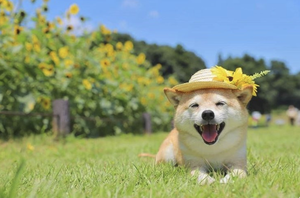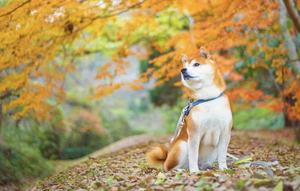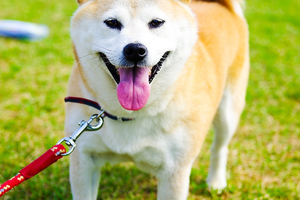
Feeding your Shiba Inu is one of the most important aspects of pet care. A healthy diet can help your furry friend maintain a healthy weight, prevent disease, and ensure they have enough energy to play and explore. However, with so many types of dog food and feeding schedules to choose from, it can be difficult to know where to start. In this blog post, we’ll cover everything you need to know about feeding your Shiba Inu, from the different types of food available to the best feeding schedule for your dog. Whether you’re a new Shiba Inu owner or are looking to improve your dog’s diet, this blog post has everything you need to know.
Types of Food
There are several types of food available for Shiba Inus, including kibble, wet food, and raw food. Kibble is the most commonly used, as it is convenient and easy to store. Wet food is also a popular option, as it can provide more moisture and flavor than kibble. Raw food, while less common, is a great option for dogs with allergies or digestive issues. Each type of food has its pros and cons, and the best option for your Shiba Inu will depend on their individual needs and preferences. In the next section, we’ll discuss the nutritional requirements of Shiba Inus and how to choose a food that meets those needs.
Nutritional Requirements
Shiba Inus have specific nutritional requirements that must be met in order to maintain good health. These include a balanced ratio of protein, fat, and carbohydrates, as well as essential vitamins and minerals. When choosing a dog food for your Shiba Inu, look for one that includes high-quality sources of protein, such as chicken, lamb, or fish. Avoid dog foods that contain fillers or by-products, as these can be hard to digest and may not provide the necessary nutrients. It’s also important to choose a dog food that is appropriate for your dog’s age and activity level. Puppies and active adult dogs will require more calories and protein than older or less active dogs. Consulting with your veterinarian can help you determine the best diet for your Shiba Inu based on their specific needs.
Feeding Schedule
Establishing a regular feeding schedule is important for your Shiba Inu’s health and wellbeing. Most adult Shiba Inus should be fed twice a day, while puppies may require more frequent feedings. Avoid free-feeding, which can lead to overeating and obesity. When determining how much to feed your Shiba Inu at each meal, consider their age, weight, and activity level. Use the feeding guidelines on the dog food label as a starting point, and adjust as needed based on your dog’s individual needs. It’s also important to make sure your Shiba Inu has access to fresh, clean water at all times. In the next section, we’ll discuss food allergies and sensitivities in Shiba Inus and how to choose a diet that is free from common allergens.
Food Allergies and Sensitivities
Like humans, dogs can develop food allergies and sensitivities. Common allergens in dog food include beef, chicken, dairy, and wheat. Symptoms of a food allergy or sensitivity in Shiba Inus can include skin irritation, digestive issues, and ear infections. If you suspect your Shiba Inu has a food allergy or sensitivity, consult with your veterinarian. They may recommend an elimination diet to identify the allergen, or suggest a hypoallergenic dog food that is free from common allergens. When choosing a dog food for your Shiba Inu, read the ingredient list carefully to ensure it does not contain any ingredients they may be allergic to.
Homemade Dog Food
Some Shiba Inu owners prefer to make their own dog food at home, either to save money or to ensure their dog is getting the best possible nutrition. While homemade dog food can be a great option, it’s important to make sure your dog is getting all the nutrients they need. When making homemade dog food, include a balance of protein, fat, and carbohydrates, and be sure to include essential vitamins and minerals. Avoid using ingredients that are toxic to dogs, such as garlic, onions, and chocolate. If you’re not sure where to start, there are plenty of recipes available online. Just be sure to consult with your veterinarian to make sure your homemade dog food meets your dog’s nutritional requirements.
Choosing the Best Dog Food
With so many dog food brands available, it can be difficult to know which one to choose for your Shiba Inu. When selecting a dog food, look for one that includes high-quality sources of protein, such as chicken, lamb, or fish. Avoid dog foods that contain fillers or by-products, as these can be hard to digest and may not provide the necessary nutrients. It’s also important to choose a dog food that is appropriate for your dog’s age and activity level. Puppies and active adult dogs will require more calories and protein than older or less active dogs. Look for dog foods that are labeled “complete and balanced,” meaning they meet your dog’s nutritional requirements. Finally, read customer reviews to get an idea of how other Shiba Inu owners feel about the dog food brand you’re considering.
Feeding your Shiba Inu a healthy diet is key to keeping them happy and healthy. When choosing a dog food, consider your Shiba Inu’s nutritional requirements, age, and activity level. Choose a high-quality dog food that is free from fillers and by-products, and avoid common allergens if your dog has a food allergy or sensitivity. Establish a regular feeding schedule, and be sure to provide your Shiba Inu with fresh, clean water at all times. While homemade dog food can be a great option, be sure to consult with your veterinarian to make sure your dog is getting all the nutrients they need. With a little bit of research, you can find the best diet for your furry friend and ensure they stay healthy and happy for years to come.




